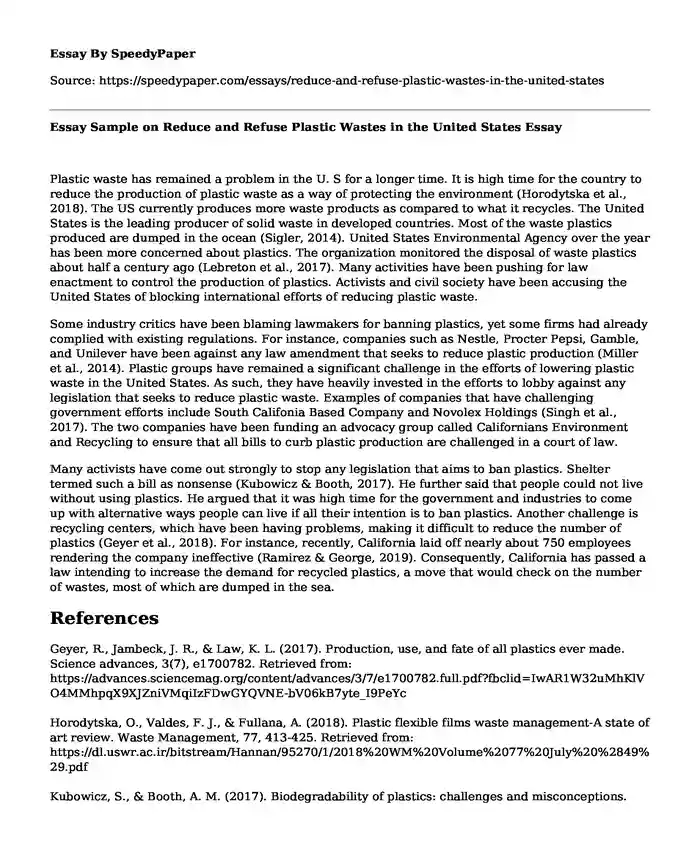
| Essay type: | Problem solution essays |
| Categories: | United States Ecology Pollution Social responsibility |
| Pages: | 3 |
| Wordcount: | 629 words |
Plastic waste has remained a problem in the U. S for a longer time. It is high time for the country to reduce the production of plastic waste as a way of protecting the environment (Horodytska et al., 2018). The US currently produces more waste products as compared to what it recycles. The United States is the leading producer of solid waste in developed countries. Most of the waste plastics produced are dumped in the ocean (Sigler, 2014). United States Environmental Agency over the year has been more concerned about plastics. The organization monitored the disposal of waste plastics about half a century ago (Lebreton et al., 2017). Many activities have been pushing for law enactment to control the production of plastics. Activists and civil society have been accusing the United States of blocking international efforts of reducing plastic waste.
Some industry critics have been blaming lawmakers for banning plastics, yet some firms had already complied with existing regulations. For instance, companies such as Nestle, Procter Pepsi, Gamble, and Unilever have been against any law amendment that seeks to reduce plastic production (Miller et al., 2014). Plastic groups have remained a significant challenge in the efforts of lowering plastic waste in the United States. As such, they have heavily invested in the efforts to lobby against any legislation that seeks to reduce plastic waste. Examples of companies that have challenging government efforts include South Califonia Based Company and Novolex Holdings (Singh et al., 2017). The two companies have been funding an advocacy group called Californians Environment and Recycling to ensure that all bills to curb plastic production are challenged in a court of law.
Many activists have come out strongly to stop any legislation that aims to ban plastics. Shelter termed such a bill as nonsense (Kubowicz & Booth, 2017). He further said that people could not live without using plastics. He argued that it was high time for the government and industries to come up with alternative ways people can live if all their intention is to ban plastics. Another challenge is recycling centers, which have been having problems, making it difficult to reduce the number of plastics (Geyer et al., 2018). For instance, recently, California laid off nearly about 750 employees rendering the company ineffective (Ramirez & George, 2019). Consequently, California has passed a law intending to increase the demand for recycled plastics, a move that would check on the number of wastes, most of which are dumped in the sea.
References
Geyer, R., Jambeck, J. R., & Law, K. L. (2017). Production, use, and fate of all plastics ever made. Science advances, 3(7), e1700782. Retrieved from: https://advances.sciencemag.org/content/advances/3/7/e1700782.full.pdf?fbclid=IwAR1W32uMhKlVO4MMhpqX9XJZniVMqiIzFDwGYQVNE-bV06kB7yte_I9PeYc
Horodytska, O., Valdes, F. J., & Fullana, A. (2018). Plastic flexible films waste management-A state of art review. Waste Management, 77, 413-425. Retrieved from: https://dl.uswr.ac.ir/bitstream/Hannan/95270/1/2018%20WM%20Volume%2077%20July%20%2849%29.pdf
Kubowicz, S., & Booth, A. M. (2017). Biodegradability of plastics: challenges and misconceptions. Retrieved from: https://pubs.acs.org/doi/full/10.1021/acs.est.7b04051
Lebreton, L. C., Van Der Zwet, J., Damsteeg, J. W., Slat, B., Andrady, A., & Reisser, J. (2017). River plastic emissions to the world's oceans. Nature Communications, 8, 15611. Retrieved from: https://www.nature.com/articles/ncomms15611.
Miller, L., Soulliere, K., Sawyer-Beaulieu, S., Tseng, S., & Tam, E. (2014). Challenges and alternatives to plastics recycling in the automotive sector. Materials, 7(8), 5883-5902. Retrieved from: https://www.mdpi.com/1996-1944/7/8/5883
Ramirez, A., & George, B. (2019). Plastic recycling and waste reduction in the hospitality industry: Current challenges and some potential solutions. Economics, Management and Sustainability, 4(1). https://cyberleninka.ru/article/n/plastic-recycling-and-waste-reduction-in-the-hospitality-industry-current-challenges-and-some-potential-solutions
Sigler, M. (2014). The effects of plastic pollution on aquatic wildlife: current situations and future solutions. Water, Air, & Soil Pollution, 225(11), 2184. Retrieved from: https://projectdragonfly.miamioh.edu/wp-content/uploads/2019/06/Sigler_Michelle_Water-Air-Soil-Pollut_2014.pdf
Singh, N., Hui, D., Singh, R., Ahuja, I. P. S., Feo, L., & Fraternali, F. (2017). Recycling of plastic solid waste: A state of the art review and future applications. Composites Part B: Engineering, 115, 409-422. https://www.fernandofraternaliresearch.com/publications/JCOMB_Recycling_Review_2016_Online_First.pdf
Cite this page
Essay Sample on Reduce and Refuse Plastic Wastes in the United States. (2023, Jul 23). Retrieved from https://speedypaper.net/essays/reduce-and-refuse-plastic-wastes-in-the-united-states
Request Removal
If you are the original author of this essay and no longer wish to have it published on the SpeedyPaper website, please click below to request its removal:
- Free Essay on Humanitarian Intervention in Libya
- Energy Industry Influence on Public Debt and GDP Growth, Free Essay in Economics
- Essay Example on Tourism and Climate Change
- Free Essay Sample on Global Energy Sustainability
- Essay Sample on Heroin Mitigation
- Free Essay Example on the Energy Crisis and Why It Existed
- Free Essay on From 9/11 to Homeland Security: Examining the Impact of Major Terrorist Attacks on U.S. Security Systems
Popular categories




